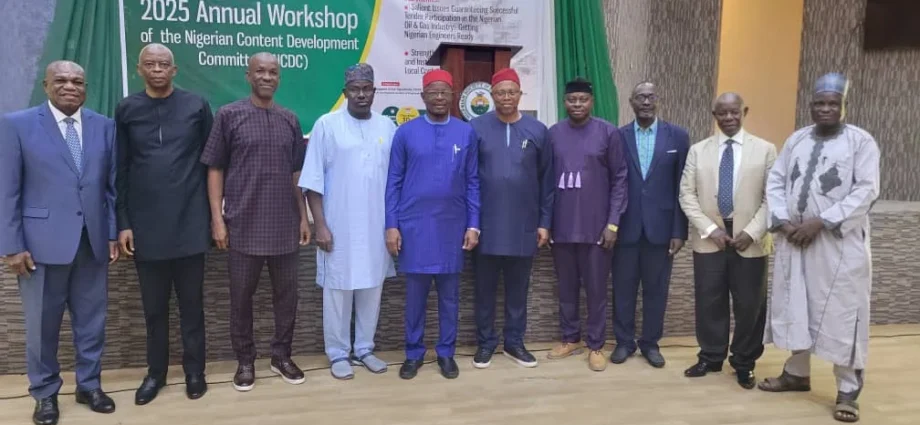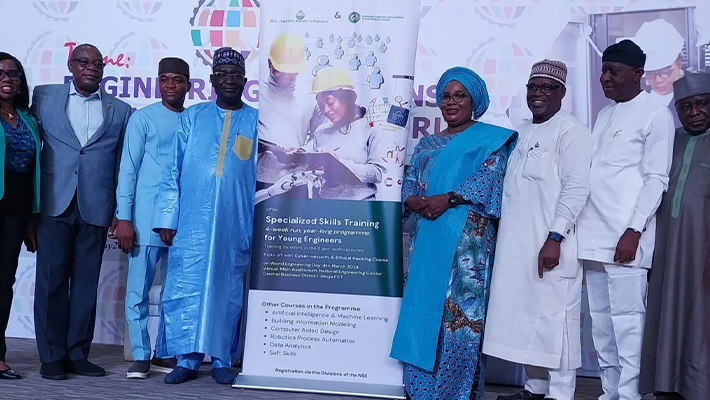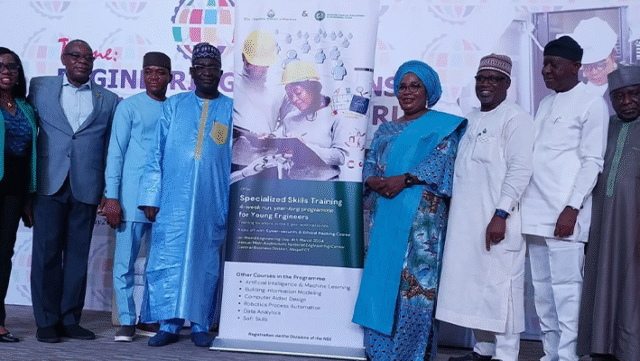With the theme “Strengthening Nigeria’s Domestic Business Development: Leveraging Local Content Principles for Sustainable Economic Growth”, the Nigerian Society of Engineers (NSE), speaking through its veterans and stakeholders, is urging the federal government and the private sector to ramp up local-content policies as a pivotal strategy to create jobs, retain value, and advance industrialisation.
At its 2025 annual workshop of the Nigerian Content Development Committee (NCDC) held in Abuja, the call was sharpened by the registrar of the Council for the Regulation of Engineering in Nigeria (COREN), Professor Okorie Uche, who described local content as “a pragmatic strategy for retaining value, building domestic capacity, and promoting innovation”.
The overarching message is that Nigeria must move beyond being predominantly a consumer and importer to becoming a producer, processor, and exporter — thereby generating meaningful employment and advancing sustainable growth.

Table of Contents
Why stronger local content is vital now
Nigeria is endowed with abundant human and natural resources, yet much of the economic value is lost to foreign-dominated supply chains and import dependency. According to Prof. Uche, local content policies ensure Nigerian labour, materials and services are utilised — injecting value into the domestic economy instead of allowing it to flow out.
The benefits outlined are far-reaching:
- Job creation – By encouraging local participation in production, manufacturing and services, more Nigerians can be hired.
- Industrial development – Domestic manufacturing and processing become possible when local content policies prioritise Nigerian firms and technology.
- Value retention – When production, assembly or services happen locally, more of the economic value stays in Nigeria, rather than being shipped overseas.
- Skills, technology and capacity building – Local content demands not just local labour, but upgraded skills, technology transfer and indigenous enterprises.
In short, Local-content implementation is framed as a lever to shift Nigeria’s economy from “importer/consumer” to “producer/exporter”.

What must be done: The NSE’s proposed roadmap
At the event, NSE and its speakers laid out a set of actions they believe are critical to making local-content policies effective across sectors, not just oil and gas. Below are key steps:
- Policy extension and harmonisation
Although local content has its roots in the oil and gas sector, the NSE emphasises it must apply to agriculture, ICT, manufacturing, construction, and services. The government’s “Nigeria First” procurement policy is cited as a beginning, but the society says it must be scaled up and enforced. - Procurement reform and prioritisation of Nigerian firms
Government and project-owners must prioritise Nigerian materials, labour and enterprises in all procurement and project-planning processes. Prof. Uche urged this as a “pragmatic strategy” rather than mere nationalism. - Capacity building, finance access and technology transfer
To participate meaningfully, domestic firms need unfettered access to finance, infrastructure, skills and modern technology. The workshop identified these as critical enablers. - Institutional oversight, transparency and standards
Ensuring implementation is credible means having strong oversight, clear standards (quality, safety, environment) and accountability. Local content should not compromise on these. - Creating linkages between local and global
The NSE stressed the need for Nigerian firms to be part of global value chains, able to service not just domestic projects but export. Domestic capacities should be developed with the export horizon in mind.
In the words of the NSE President, Margaret Oguntala, represented at the workshop: “Through its work, the Society continues to advance key objectives central to national development” — which include local content participation and indigenous capacity.
The challenges ahead and why urgency is required
While the blueprint sounds promising, the NSE speakers did not shy away from acknowledging the challenges. Among them: Nigeria’s long-standing dependence on imports, foreign dominance of supply chains, weak infrastructure and fragmented policy enforcement.
The urgency is underscored by the fact that until Nigerian enterprises are deeply embedded in every link of production, much of the economic value continues to leak overseas. It also means that job opportunities remain insufficient in the face of growing youth unemployment.
Further:
- Without strong local-content rules across sectors, Nigeria risks continuing as a low-value-adding economy rather than moving up the value chain.
- If Nigerian firms cannot access finance or technology, the ambition of domestic participation remains aspirational rather than real.
- Transparent oversight is essential—without it, local content risks becoming a buzzword rather than a transformative tool.
Because of these factors, the NSE emphasised that now is not the time to delay. Scaling local content across agriculture, manufacturing, ICT, construction, and services could substantially shift the employment landscape and deliver more sustainable growth.

What this means for Nigeria and Nigerians
For the everyday Nigerian—whether an engineer, a small business owner, or a job-seeker—the call by the NSE points to a possible turning-point. Imagine: more contracts awarded to Nigerian companies, more jobs for local talent, more locally manufactured inputs, less dependence on imports, and stronger capacity built within our borders.
For the economy: A well-executed local-content strategy could lead to more value retained locally, a stronger manufacturing base, deeper linkages across sectors, and a more resilient industrial ecosystem.
For policy-makers and the private sector: The message is clear — local content must move from policy discourse into meaningful action. Government agencies need to restructure procurement and oversight mechanisms. Private investors need to partner with domestic firms. Nigerian firms must step up to the challenge through capacity-building and innovation.
In the words of Prof. Uche: “Local content is not nationalism for its own sake; it is a pragmatic approach to retaining value, building domestic capacity and fostering innovation.”
If implemented with sincerity, local content could become a cornerstone of Nigeria’s economic revival rather than simply an aspirational slogan. And as the NSE insists, stronger local content policies are not just good policy—they are vital for jobs, value creation and Nigeria’s future.
Join Our Social Media Channels:
WhatsApp: NaijaEyes
Facebook: NaijaEyes
Twitter: NaijaEyes
Instagram: NaijaEyes
TikTok: NaijaEyes





